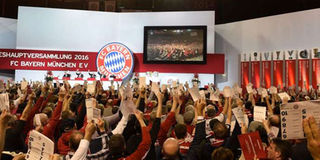Uli Hoeness - German football saint, tax sinner

Members vote for the former and new President of FC Bayern Munich Uli Hoeness during the general meeting of the German first division Bundesliga team FC Bayern Munich in Munich, southern Germany, on November 25, 2016. PHOTO | CHRISTOF STACHE |
What you need to know:
- After 21 months behind bars, Hoeness was released in February from Landsberg prison, where Adolf Hitler wrote 'Mein Kampf', after being convicted of evading at least 28.5 million euros ($31.5 million) in taxes.
- His stint in jail saw the outspoken character endure public humiliation as a fallen role model and newspaper mockery as a hypocrite who "preaches water and drinks wine".
BERLIN
Uli Hoeness was on Friday re-elected as Bayern Munich's president, returning to lead Germany's top club despite a spectacular own goal which landed him in jail.
After 21 months behind bars, Hoeness was released in February from Landsberg prison, where Adolf Hitler wrote 'Mein Kampf', after being convicted of evading at least 28.5 million euros ($31.5 million) in taxes.
His stint in jail saw the outspoken character endure public humiliation as a fallen role model and newspaper mockery as a hypocrite who "preaches water and drinks wine".
His comment, "criminals have no place in football", uttered when it emerged in 2000 that ex-Bundesliga coach Christoph Daum had used cocaine, has regularly come back to haunt him.
"I know this is stupid, but I pay my taxes in full," told to Bild in 2005, was another Hoeness statement which received plenty of air time.
But such is his popularity at Bayern that he has been welcomed back with open arms by his beloved club, which he helped turn into a European powerhouse and global brand, despite his public fall from grace.
"Uli is Father Teresa of the Tegernsee (where he lives), the Nelson Mandela of Saebener street (Bayern's training ground) and the Mother of all managers"," quipped Bayern's chairman on Hoeness' 60th birthday four years ago.
STAR PLAYER
Hoeness was born in post-war Germany in 1952 into a conservative Catholic middle-class family, living in a humble flat above his father's butcher's shop in the town of Ulm.
The teenager's passion was football which, by some accounts, he practised until he dropped from exhaustion. His discipline and athletic talent were noted early and he joined Bayern Munich at age 18.
Since then, Hoeness has come to personify the club and never tolerated criticism of his beloved Bayern, giving many a reporter who dared to slight the team an unforgiving tongue-lashing.
As a young star player, Hoeness, alongside the legendary Franz Beckenbauer and goal-scoring ace Gerd Mueller, was at the heart of the team which won the European Cup three times in 1974-76.
When a persistent knee injury forced him to retire at just 27, the club made him their youngest-ever general manager. And when Beckenbauer stood down as Bayern president in 2009, Hoeness was ready to succeed him after a 30-year apprenticeship.
Ever since, Hoeness has been the driving force behind the rise of the club, which now boasts a massive membership, state-of-the-art stadium and huge profits.
While Hoeness is a hard-nosed businessman, he also drove a culture of helping teams in financial trouble by staging friendlies, and in 2005 lent near-bankrupt Borussia Dortmund two million euros ($2.8 million) to pay their players.
Hoeness has gone out of his way to support players in distress: he made sure the retired Mueller was treated in a clinic when he was battling alcoholism. Mueller later became a reserve team coach at Bayern.
Hoeness twice narrowly escaped death, first from a serious car accident in 1975 and then a light plane crash in 1982, which killed three of his friends. A dazed and bloodied Hoeness wandering through the woods simply told his rescuer: "I am cold, I am freezing."
MORAL APOSTLE
In the close-knit elite of conservative Bavaria, Hoeness has been a confidant of top state politicians, and not afraid to share his conservative views on politics and morality on TV talk shows.
As the co-founder of a lucrative sausage business, an interest which he handed over to his two children, he long presented himself as an honest businessman.
With the conviction of the self-made man, he railed passionately against plans to raise taxes.
He told one TV show that a higher tax burden will mean "the rich will go to Austria and Switzerland ... we need to keep the rich here so we can keep milking them".
Unknown to the wider public, he was already obsessively gambling millions on stocks and currencies via his Swiss bank accounts.
Club colleagues nicknamed the pager he used to follow stock listings "tamagotchi", after the Japanese handheld computer game in which a "digital pet" demands to be constantly nursed and fed.





